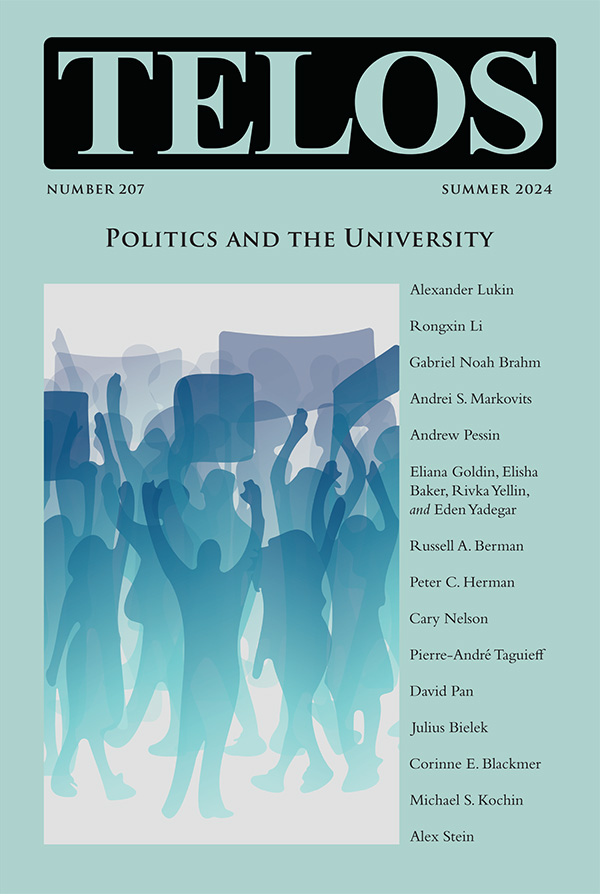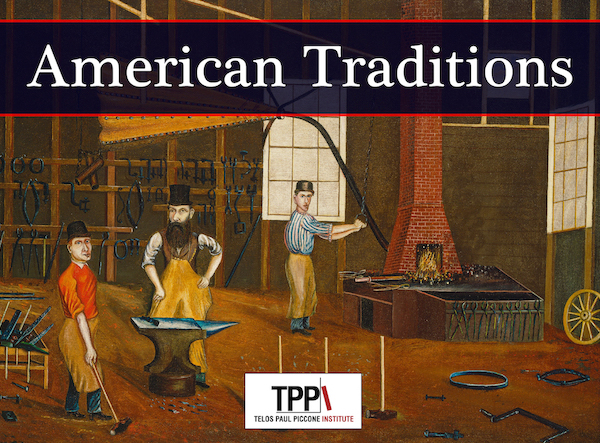By Russell A. Berman · Wednesday, July 17, 2024 The following comments refer to the interview with Michael Wolffsohn that appeared in the Frankfurter Allgemeine Zeitung on July 8, 2024. The interview is published in English translation on TelosScope here.
 October 7 and its aftermath are matters primarily concerning regional security in the Middle East, including Israeli national security, the status of the Palestinians, but ultimately the root cause, Iranian hegemonic ambitions and Tehran’s hostility to the United States. But October 7 has simultaneously unleashed a revival of antisemitism across the West, and often enough especially in the universities in the form of a pernicious left-wing antisemitism. Telos and the Telos-Paul Piccone Institute have devoted considerable attention to this phenomenon. October 7 and its aftermath are matters primarily concerning regional security in the Middle East, including Israeli national security, the status of the Palestinians, but ultimately the root cause, Iranian hegemonic ambitions and Tehran’s hostility to the United States. But October 7 has simultaneously unleashed a revival of antisemitism across the West, and often enough especially in the universities in the form of a pernicious left-wing antisemitism. Telos and the Telos-Paul Piccone Institute have devoted considerable attention to this phenomenon.
Academic antisemitism is not fully congruent with antisemitism in other social sectors. What happens at Columbia is not exactly the same as what transpired notoriously at Charlottesville, but it would be foolish to deny the unmistakable affinities in the varieties of antisemitism. In the same vein, it is important to keep in mind differences between national settings, but comparative reflections can help tease out important strands common across current manifestations of antisemitism. National particularity in this matter is most salient for Germany, given the shadow of the Holocaust. Germany also incubated a far left that pursued a radically anti-Israel politics at least since the 1960s, and Germany more recently welcomed large numbers of refugees from the Middle East, countries where antisemitic views are widespread. At the same time, however, Germany, especially since the fall of the Berlin Wall and the subsequent unification, has witnessed the growth of a vibrant Jewish community. This combination of heterogeneous factors makes the German situation deserving of particular attention.
Continue reading →
By Michael Hanfeld · Wednesday, July 17, 2024 The following interview with historian Michael Wolffsohn originally appeared in the Frankfurter Allgemeine Zeitung on July 8, 2024, and is published here in English translation by permission. See Russell A. Berman’s post today on TelosScope for comments on this interview. For background on the incident on the Markus Lanz talk show, click here. Translated by Mark S. Weiner.
Historian Michael Wolffsohn says that for Jews in Germany, the past has become present. Nobody in Germany should be complacent. An interview.
Mr. Wolffsohn, last week you were a guest on the Markus Lanz talk show on [the television channel] ZDF. The broadcast was about Israel and the Palestinians and the threat to Jewish life in Germany. After a little more than an hour, you stood up and said that you didn’t want to take part in “agitprop.” You were referring to the comments of author Deborah Feldman, who was also in the group. Why “agitprop”?
 Ms. Feldman argues like the Western New Left of the 1960s. And since I’m a ’68er, at least in generational terms, though not ideologically, I know the technique. It’s a classic method of left-wing agitation, in this case about the Jewish issue. Ms. Feldman veers from one orthodoxy to another, from Jewish to left-wing orthodoxy. Both are equally anti-Israel. For Jewish orthodoxy [for instance, some outlier sects such as the ultra-Orthodox Satmar Hasidic community, who are at odds with mainstream Haredi and Modern Orthodox Judaism—trans.], the State of Israel is blasphemy, and for the Left, the State of Israel is also unacceptable. In this respect, Ms. Feldman has remained true to herself. Ms. Feldman argues like the Western New Left of the 1960s. And since I’m a ’68er, at least in generational terms, though not ideologically, I know the technique. It’s a classic method of left-wing agitation, in this case about the Jewish issue. Ms. Feldman veers from one orthodoxy to another, from Jewish to left-wing orthodoxy. Both are equally anti-Israel. For Jewish orthodoxy [for instance, some outlier sects such as the ultra-Orthodox Satmar Hasidic community, who are at odds with mainstream Haredi and Modern Orthodox Judaism—trans.], the State of Israel is blasphemy, and for the Left, the State of Israel is also unacceptable. In this respect, Ms. Feldman has remained true to herself.
The position claims that Jews aren’t safe in Germany because Germany has bound its state interest with Israel’s. Germany is preventing peace in the Middle East. If Jews feel unsafe in our country, it’s the fault of the state and its institutions, especially the police. Deborah Feldman claims that she almost has a heart attack when she simply beholds a German police officer.
Continue reading →
By David Pan · Friday, July 12, 2024 Telos 207 (Summer 2024): Politics and the University is now available for purchase in our store. Individual subscriptions to Telos are also available in both print and online formats.
 There is a fundamental arbitrariness about the work that is done at colleges and universities, which stems from the relationship between academic work and the political parameters of this work. The key issue is that the most basic aspect of our humanity involves having a sense of right and wrong. This sense of values sets the framework for all our other thoughts, actions, and decisions, providing direction and meaning for our lives. There is a fundamental arbitrariness about the work that is done at colleges and universities, which stems from the relationship between academic work and the political parameters of this work. The key issue is that the most basic aspect of our humanity involves having a sense of right and wrong. This sense of values sets the framework for all our other thoughts, actions, and decisions, providing direction and meaning for our lives.
The feeling that we are doing the right thing can motivate us to great achievements, and the loss of that feeling can lead us into inescapable despair. At the same time, when we perceive that others are doing wrong, we have a feeling of indignation at such injustice and seek to redress it. We will also judge the wrong doer in the same harsh light that we might use against ourselves when we fail to live up to our own ideals. Consequently, our sense of values will color all our perceptions and determine our decisions and judgments.
Continue reading →
The video of the sixth webinar in the Telos-Paul Piccone Institute’s Israel Initiative is now available and can be viewed here. Titled “Free Speech and Campus Antisemitism: Academic Freedom, to What End?,” the panel featured Michael S. Kochin, Geoff Shullenberger, and Jacob Siegel, and their conversation was moderated by Israel Initiative director Gabriel Noah Brahm.
The next webinar in the Israel webinar series will take place on July 7.
Continue reading →
By Gerald Berk · Thursday, May 30, 2024 I am a professor emeritus of political science at the University of Oregon, and I am an observant, progressive Jew. I appreciate the efforts of conservatives, some of whom have made valuable contributions to the Telos-Paul Piccone Institute’s Israel initiative, to expose antisemitism in my profession and among my students since October 7. I share their concern that anti-Zionism has become one plank in an anti-liberal, anti-capitalist, anti-American project characteristic of some segments of the contemporary left. It’s vital to bear in mind that Jews have thrived when liberal, American values and institutions have been strong.
 
Does this mean, as Bari Weiss counsels, that I should join Jews in a lockstep turn to the right? I think not. Twenty-five years ago, in Achieving Our Country, Richard Rorty challenged what he called the “cultural left” to suspend high theory, identity politics, and cultural revolution to attend instead to the economic distress of the many Americans left behind by neoliberalism. He challenged an increasingly anti-American left to build a left-wing patriotism. And he pointed to domestic historical resources to realize those aims in the work of Emerson, Whitman, and Dewey. Rorty feared the alternative to such pragmatic liberalism was an authoritarian demagogue, who would reverse the gains of identity politics and usher in an era of American fascism.
Continue reading →
 In the latest episode of the Telos-Paul Piccone Institute podcast, Gabriel Noah Brahm, director of TPPI’s Israel Initiative, talks with German political scientist Dr. Matthias Küntzel about the Nazi roots of the Hamas atrocities of October 7, 2023, and about the dangers posed today by Iran. This conversation follows TPPI’s webinar of February 7, 2024, “Historians on Ideology and Politics in the 1948 War,” with Küntzel, Jeffrey Herf, and Benny Morris. The podcast is available in both video and audio-only formats. In the latest episode of the Telos-Paul Piccone Institute podcast, Gabriel Noah Brahm, director of TPPI’s Israel Initiative, talks with German political scientist Dr. Matthias Küntzel about the Nazi roots of the Hamas atrocities of October 7, 2023, and about the dangers posed today by Iran. This conversation follows TPPI’s webinar of February 7, 2024, “Historians on Ideology and Politics in the 1948 War,” with Küntzel, Jeffrey Herf, and Benny Morris. The podcast is available in both video and audio-only formats.
Küntzel’s books Germany and Iran: From the Aryan Axis to the Nuclear Threshold and Jihad and Jew-Hatred: Islamism, Nazism and the Roots of 9/11 are available in the Telos Press store.
Continue reading →
|
|
 October 7 and its aftermath are matters primarily concerning regional security in the Middle East, including Israeli national security, the status of the Palestinians, but ultimately the root cause, Iranian hegemonic ambitions and Tehran’s hostility to the United States. But October 7 has simultaneously unleashed a revival of antisemitism across the West, and often enough especially in the universities in the form of a pernicious left-wing antisemitism. Telos and the Telos-Paul Piccone Institute have devoted considerable attention to this phenomenon.
October 7 and its aftermath are matters primarily concerning regional security in the Middle East, including Israeli national security, the status of the Palestinians, but ultimately the root cause, Iranian hegemonic ambitions and Tehran’s hostility to the United States. But October 7 has simultaneously unleashed a revival of antisemitism across the West, and often enough especially in the universities in the form of a pernicious left-wing antisemitism. Telos and the Telos-Paul Piccone Institute have devoted considerable attention to this phenomenon. 



